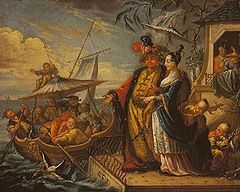- Marriage in ancient China
-
 Chinese wedding in ancient China
Chinese wedding in ancient China
Marriage in ancient China was affected by the greater gender inequality experienced by women in ancient China as compared to Chinese women in the modern era.
Concubines
 A European painting of an Emperor of China inspecting his fantasy fishing fleet with his concubines
A European painting of an Emperor of China inspecting his fantasy fishing fleet with his concubines
In Ancient China, successful men often supported several concubines, and Chinese Emperors kept thousands of concubines.[1] A concubine's treatment and situation was highly variable according to the social status of the male with whom she was engaged, as well as the attitude of the wife; the position of the concubine was generally inferior to that of the wife. Though a concubine could produce heirs, her children would be inferior in status to legitimate children. Concubines were allegedly, on occasion, buried alive with their masters to "keep them company in the afterlife."[1]
Despite the limitations imposed on ancient Chinese concubines, history and literature have examples of concubines achieving great power and influence. For example, in one of the Four Great Classical Novels of China, The Dream of the Red Chamber (believed to be a semi-autobiographical account of author Cao Xueqin's own family life), three generations of the Jia family are supported by one favorite concubine of the Emperor.
Imperial concubines, kept by Emperors in the Forbidden City, were traditionally guarded by eunuchs to ensure that they could not be impregnated by anyone but the Emperor.[1] Lady Yehenara, otherwise known as Dowager Empress Cixi, was arguably one of the most successful concubines in China’s history. Cixi first entered the court as a concubine to the Xianfeng Emperor and gave birth to an illegitimate male heir, who would become the Tongzhi Emperor. The Emperor passed over many legitimate male heirs and named Cixi's son the Crown Prince. She would eventually become the de facto ruler of the Manchu Qing Dynasty in China for 47 years after her son's death.[2]
References
- ^ a b c "Concubines in Ancient China". Beijing Made Easy. http://www.beijingmadeeasy.com/beijing-history/concubines-of-ancient-china.
- ^ Dragon lady: the life and legend of the last empress of China. Vintage Books. 1993.
See also
- Women in the People's Republic of China
- Ghost marriage (Chinese)
- Walking marriage
- Heqin
- Shim-pua marriage
- Gender equality
- Gender inequality
- Urban and Rural society in the People's Republic of China
- Women in ancient China
- Women's healthcare in the People's Republic of China
- Feminism in China
- Impact of globalization on women in China
- Globalization and women in China
Categories:- China stubs
- Marriage, unions and partnerships in China
- Marriage, unions and partnerships by country
- Chinese society
Wikimedia Foundation. 2010.
